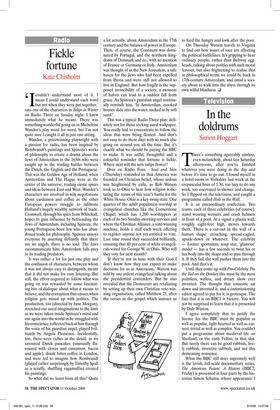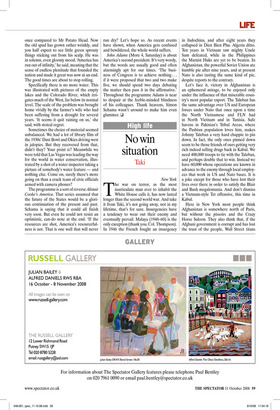In the doldrums
Simon Hoggart
There’s something agreeably aimless, even melancholy, about late Saturday afternoons, after you’ve finished whatever you were doing in the day and before it’s time to go out. I found myself in a hotel room in Yorkshire last week at the crepuscular hour of 5.30, too lazy to do any work, too enervated to shower and change. So I flipped on the television, and caught a programme called Hole in the Wall.
It is an extraordinary confection. Two teams, each of three celebrities (of course), stand wearing wetsuits and crash helmets in front of a pool. At a signal a plastic wall, roughly eight-feet high, moves towards them. There is a cut-out in the wall of a human shape: crouching, spread-eagled, upside-down or whatever. The celebrity — former sportsman, soap star, ‘glamour’ model — has a few seconds to twist his or her body into the shape and so pass through it. If they fail, the wall pushes them into the pool. And that’s it.
Until they come up with Pro-Celebrity Pin the Tail on the Donkey this must be the most pointless, witless, and dreary show ever invented. The thought that someone sat down and invented it, and a commissioning editor agreed to pay for it, is grotesque. The fact that it is on BBC1 is bizarre. You will not be surprised to learn that it is presented by Dale Winton.
I agree completely that to justify the licence fee the BBC must be populist as well as popular, light-hearted as well as earnest, trivial as well as complex. You couldn’t put a programme about medieval life on Shetland, or the early Fellini, in that slot. But surely there can be good rubbish, lively rubbish, inventive rubbish, and not this demeaning nonsense.
What the BBC still does supremely well is the lavish, full-scale documentary series. The American Future: A History (BBC2, Friday) is presented in four parts by the historian Simon Schama, whose appearance I once compared to Mr Potato Head. Now the old spud has grown rather wrinkly, and you half expect to see little green sprouty things sticking out from his scalp. He was in solemn, even gloomy mood. ‘America has run out of infinity,’ he said, meaning that the sense of endless plenitude that founded the nation and made it great was now at an end. The good times are about to stop rolling.
Specifically there is no more water. This was illustrated with pictures of the empty lakes and the Colorado River, which irrigates much of the West, far below its normal level. The scale of the problem was brought home vividly by the farmer’s wife who had been suffering from a drought for several years. ‘It seems it quit raining on us,’ she said, with stoical regret.
Sometimes the choice of material seemed unbalanced. We had a lot of library film of the 1930s’ Dust Bowl and Okies driving west in jalopies. But they recovered from that, didn’t they? Your point is? Meanwhile we were told that Las Vegas was leading the way for the world in water conservation, illustrated by a shot of a water inspector taking a picture of somebody’s water feature — and nothing else. Come on, surely there’s more going on than a crack team of civic officials armed with camera phones?
The programme is a sort of reverse Alistair Cooke’s America. That series assumed that the future of the States would be a glorious continuation of the present and past. Schama is saying that it could all finish very soon. But even he could not resist an optimistic, can-do note at the end. ‘If the resources are shot, America’s resourcefulness is not. That is one well that will never run dry!’ Let’s hope so. As recent events have shown, when America gets confused and bewildered, the whole world suffers.
John Adams (More 4, Saturday) is about America’s second president. It’s very wordy, but the words are usually good and often alarmingly apt for our times. ‘The business of Congress is to achieve nothing ... if it were proposed that two and two make five, we should spend two days debating the matter then pass it in the affirmative.’ Throughout the programme Adams is near to despair at the feeble-minded blindness of his colleagues. Thank heavens, Simon Schama wasn’t around to make him even glummer. ❑











































































 Previous page
Previous page